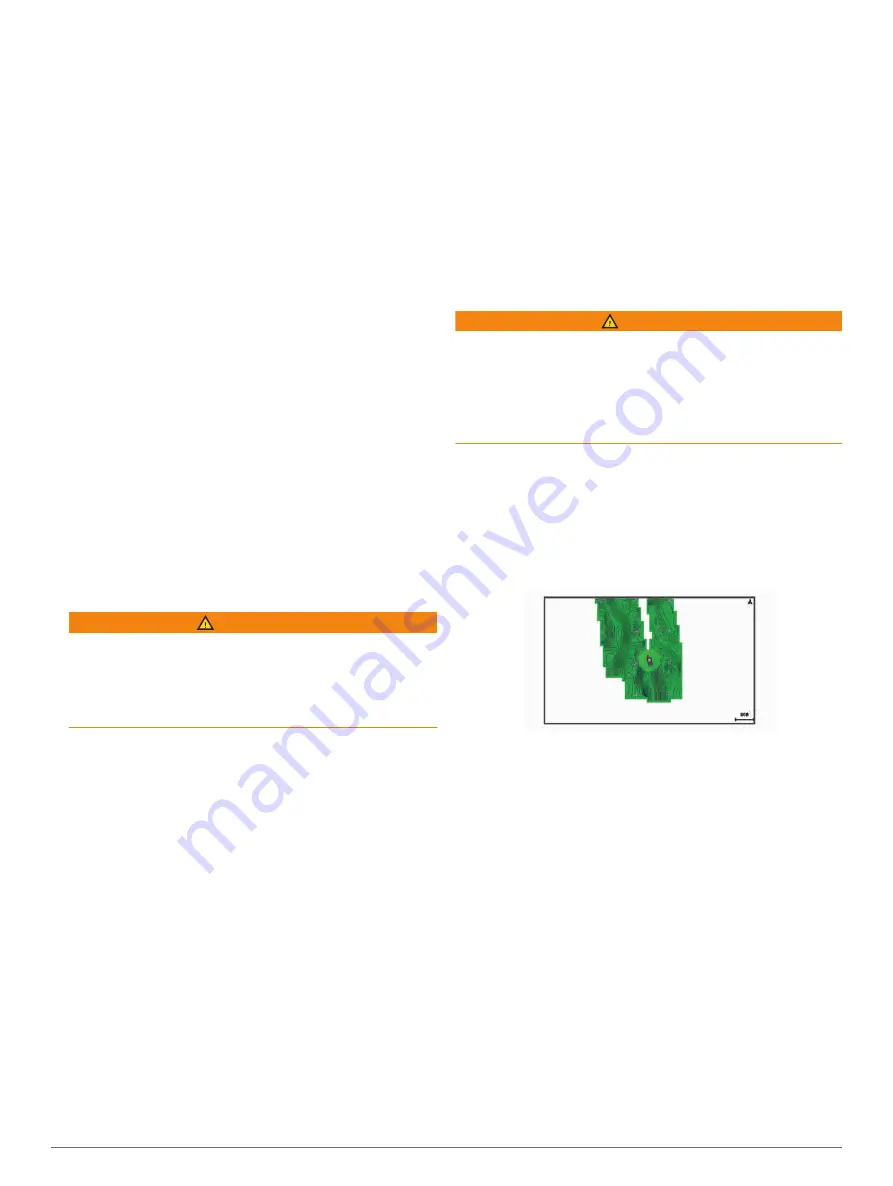
Gain
: Adjusts the gain (
).
Sea Clutter
: Adjusts the sea clutter (
the Radar Screen Automatically
).
Radar Options
: Opens the radar options menu (
).
Other Vessels
: Sets how other vessels are displayed on
the radar view (
).
Radar Setup
: Opens the radar display settings (
).
Edit Overlays
: Adjusts the data shown on the screen
).
Chart Settings
NOTE:
Not all settings apply to all charts and 3D chart
views. Some settings require external accessories or
applicable premium charts.
From a chart, select
Menu
>
Settings
.
Orientation
: Sets the perspective of the map.
Vessel Orientation
: Sets the alignment of the vessel icon
on the map. The Auto option aligns the vessel icon
using GPS COG at high speeds and the magnetic
heading at low speeds to better align the vessel icon
with the active track line. The Heading option aligns the
vessel icon with the magnetic heading. The GPS
Heading (COG) option aligns the vessel icon using
GPS COG. If the selected data source is not available,
the available data source is used instead.
WARNING
The vessel orientation setting is for informational
purposes and is not intended to be precisely followed.
Always defer to the navaids and conditions on the
water to avoid groundings or hazards that could result
in vessel damage, personal injury, or death.
Detail
: Adjusts the amount of detail shown on the map, at
different zoom levels.
Chart Size
: Sets the visible size of the chart.
World Map
: Uses either a basic world map or a shaded
relief map on the chart. These differences are visible
only when zoomed out too far to see the detailed
charts.
Start Line
: Sets the starting line for the sailing race
).
Inset Map
: Shows a small map centered on your present
location.
Fish Eye 3D Settings
NOTE:
This feature is available with premium charts, in
some areas.
From the Fish Eye 3D chart view, select Menu.
View
: Sets the perspective of the 3D chart view.
Tracks
: Shows tracks.
Sonar Cone
: Shows a cone that indicates the area
covered by the transducer.
Fish Symbols
: Shows suspended targets.
Supported Maps
To help you have a safe and enjoyable time on the water,
Garmin devices only support official maps produced by
Garmin or an approved third party producer.
You can purchase maps from Garmin. If you purchase
maps from a seller other than Garmin, investigate the
seller before purchasing. Be extra cautious with online
sellers. If you have purchased an unsupported map,
return it to the seller.
Garmin Quickdraw Contours Mapping
WARNING
The Garmin Quickdraw Contours mapping feature allows
users to generate maps. Garmin makes no
representations about the accuracy, reliability,
completeness or timeliness of the maps generated by
third parties. Any use or reliance on the maps generated
by third parties is at your own risk.
The Garmin Quickdraw Contours mapping feature allows
you to instantly create maps with contours and depth
labels for any body of water.
When Garmin Quickdraw Contours records data, a
colored circle surrounds the vessel icon. This circle
represents the approximate area of the map that is
scanned by each pass.
A green circle indicates good depth and GPS position,
and a speed under 16 km/h (10 mph). A yellow circle
indicates good depth and GPS position, and a speed
between 16 and 32 km/h (10 and 20 mph). A red circle
indicates poor depth or GPS position, and a speed above
32 km/h (20 mph).
You can view Garmin Quickdraw Contours in a
combination screen or as a single view on the map.
The amount of saved data depends on the size of your
memory card, your sonar source, and the speed of your
boat as you record data. You can record longer when you
use a single-beam sonar. It is estimated that you might be
able to record about 1,500 hours of data onto a 2 GB
memory card.
When you record data on a memory card in your
chartplotter, the new data is added to your existing
Garmin Quickdraw Contours map, and is saved on the
memory card. When you insert a new memory card, the
existing data does not transfer onto the new card.
Garmin Quickdraw Contours Mapping
19
















































